The healthcare industry generates immense volumes of patient data daily, and healthcare organizations must find effective ways to manage it. For instance, a hospital may receive a patient’s records from an external lab before a procedure. If the data isn’t organized and easily accessible, it could delay treatment and jeopardize patient health. Implementing a patient data management system can help healthcare organizations avoid such scenarios. This guide will explore the significance of a patient data management system within healthcare data management and how it can allow healthcare organizations to improve efficiency and patient outcomes.
Azulity’s healthcare master data management services can help organizations achieve these goals. Our solutions help healthcare organizations manage patient data with ease. By streamlining patient data processes, we can help your facility improve operations and enhance the quality of care.
Importance of Managing and Securing Patient Data


Cybercriminals target protected health information (PHI) due to its high value on the dark web. A single medical record contains sensitive data, including financial details, personal information, Social Security numbers, and more. When stolen data is sold on the dark web, healthcare records sell for an average of $250, compared to approximately $5 for payment card details.
Medical Records Are Not Just Files. They’re Personal Lives.
The healthcare industry is subject to several federal, state, and industry-specific data protection laws. The Healthcare Insurance Portability and Accountability Act (HIPAA) is the most well-known example. HIPAA rules apply to covered entities (e.g., healthcare providers, health plans, clearinghouses) and business associates.
While HIPAA’s data privacy and security standards are often more stringent than other industries, it’s still important for healthcare organizations to closely follow other data privacy laws. For example, 13 states have stricter regulations than HIPAA when it comes to medical record access.
Failure to comply with these regulations can result in monetary penalties exceeding hundreds of thousands of dollars (based on factors such as the severity of the breach, mitigation efforts, and the number of individuals affected).
Related Reading
7 Tips On How To Manage Patient Data


1. Use Azulity: A Smart Move for Patient Data Management
Azulity focuses on healthcare master data management, bringing proven experience in implementing healthcare data solutions and credentialing across the United States. Our comprehensive platform ensures consistent patient, provider, location, and claims data synchronization across all systems and departments.
Key features include healthcare MDM, provider MDM, reference data management, credentialing, and provider enrollment. We serve healthcare technology leaders—from CIOs and CDOs to VPs of data platforms and credentialing—helping them eliminate the costly problems of fragmented data systems. Book a call to learn more about our healthcare master data management services today!
2. Establish Patient Information Management Procedures
Utilize a collaborative approach when building your policies and procedures. To successfully manage medical records, an organization must establish robust policies and procedures prioritizing patient information security and privacy. Under the Security Rule, HIPAA requires policies to be written and retained for six years. Updates are necessary when organizational or environmental changes have the potential to affect the security of patient health information.
Successful patient information management systems engage the entire organization. Senior-level executives should obtain input from every department that generates or handles records, ensuring all aspects are covered when drafting procedures. This collaborative approach helps establish a cohesive framework and promotes organizational alignment in maintaining the security and integrity of patient information.
3. Develop Comprehensive Employee Training
Human mistakes can contribute to data breaches, so healthcare organizations must prioritize comprehensive employee training programs. While sophisticated hacking can pose a threat, most data breaches are caused by employees. A recent study found that negligent employees were responsible for 56% of insider threat security incidents. Per HIPAA’s guidelines, companies must train employees to interact with health records during any data lifecycle stage.
These training programs should cover various aspects of patient information management, including data handling, access controls, confidentiality, privacy regulations, and incident response protocols. By providing employees with the necessary knowledge and skills, organizations can foster a culture of compliance and minimize the risk of data breaches caused by human error.
4. Label Records Effectively
Proper metadata and indexing are essential for appropriate retention and disposal. To efficiently monitor patient records from creation through destruction, healthcare organizations need a comprehensive taxonomy and indexing system that covers every type of record within their operations. By accurately labeling and indexing records, healthcare providers can streamline their information management processes, reduce search times, and improve overall operational efficiency while also achieving compliance with legal and regulatory requirements related to record retention and disposal.
5. Automate Processes
Identify processes you can automate to enhance data accuracy and security. Maintaining compliance with ever-changing state and federal laws is complex, and there’s little room for human error in the medical field. A centralized patient information management system can improve accuracy, assure consistency, and protect patients by automating time-consuming processes. Additionally, automated systems can enforce standardized procedures and provide built-in checks and balances, enhancing data accuracy and integrity.
6. Improve Data Security
Your data needs to be secured from creation to disposal. Patient records must be secure from creation through destruction. Electronic records should have robust security measures, including encryption, access controls, and detailed audit trails to track and monitor access and modifications. Paper records should be physically secured in locked rooms with restricted access to prevent unauthorized handling or removal.
For records stored offsite, organizations should choose certified, climate-controlled facilities that meet stringent security standards to safeguard the confidentiality and integrity of the information. At the end of their lifecycle, paper and electronic records should be securely destroyed using methods certified by the National Association for Information Destruction (NAID) to prevent unauthorized access or retrieval.
7. Perform Self Audits
Identify vulnerabilities and ensure compliance with self-audits. HIPAA conducts regular and thorough audits, ensuring appropriate measures are in place to protect patient privacy. Organizations should implement their self-audit practices to ensure ongoing compliance and identify potential patient information management systems vulnerabilities. These self-audits should include performance and compliance monitoring and periodic assessments of the organization’s adherence to established policies and procedures.
Related Reading
- Healthcare Provider Data Management
- MDM Implementation
- Reference Data Management
- Healthcare Data Integration
- Healthcare IT Consultants
8 Best Patient Data Management System For All Your Needs
1. Azulity
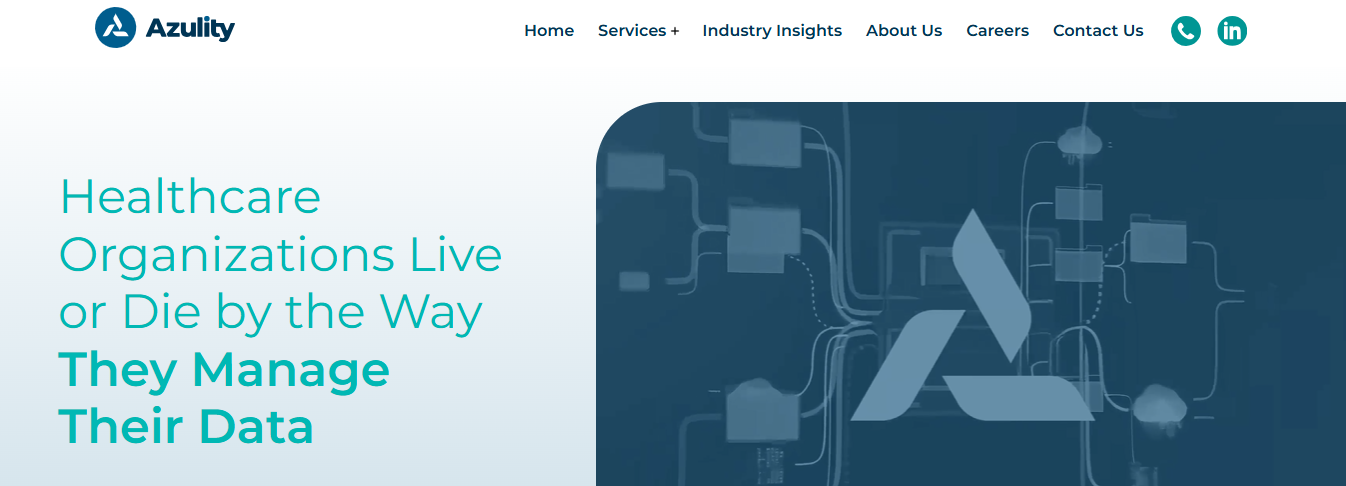

Azulity focuses on healthcare master data management, bringing proven experience in implementing healthcare data solutions and credentialing across the United States. Our comprehensive platform ensures consistent patient, provider, location, and claims data synchronization across all systems and departments.
Key features include healthcare MDM, provider MDM, reference data management, credentialing, and provider enrollment. We serve healthcare technology leaders—from CIOs and CDOs to VPs of data platforms and credentialing—helping them eliminate the costly problems of fragmented data systems. Book a call to learn more about our healthcare master data management services today!
2. Salesforce
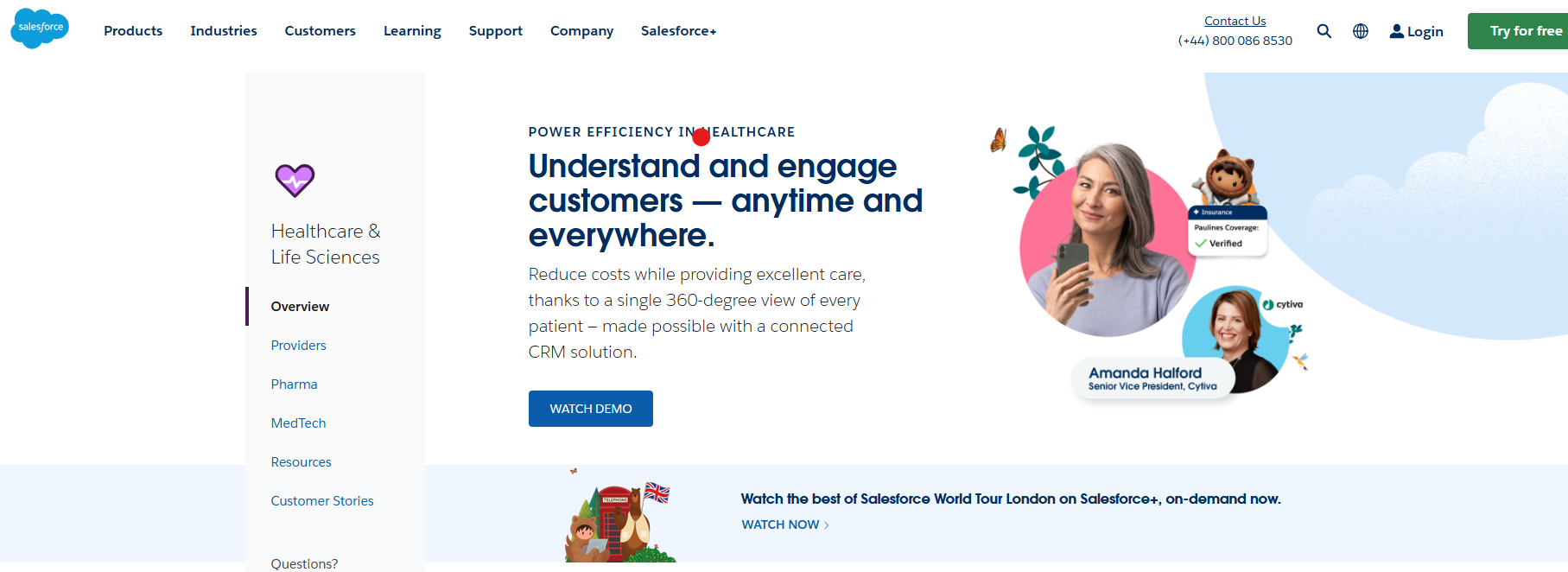

Salesforce is a robust CRM platform with a compelling product for healthcare providers and institutions—Customer 360. With Customer 360, you receive a suite of features to manage your customers—in this case, patients. Create and share forms to add detailed patient records with attributes such as contact information, clinical data, appointments, medication prescriptions, preferences, and assigned physicians to reduce bottlenecks: track medication records, dosages, and refills in real time. The tool’s intelligent appointment management features let you optimize your workdays. For instance, you can inform your patients what lab reports they must bring to appointments beforehand to avoid misunderstandings.
Pros
- Supports detailed patient records.
- Customizable forms to collect information.
- Intelligent appointment management.
- Comprehensive medication records.
Cons
- Smaller clinics may need more budget.
- Navigating and finding items can be time-consuming.
3. DrChrono
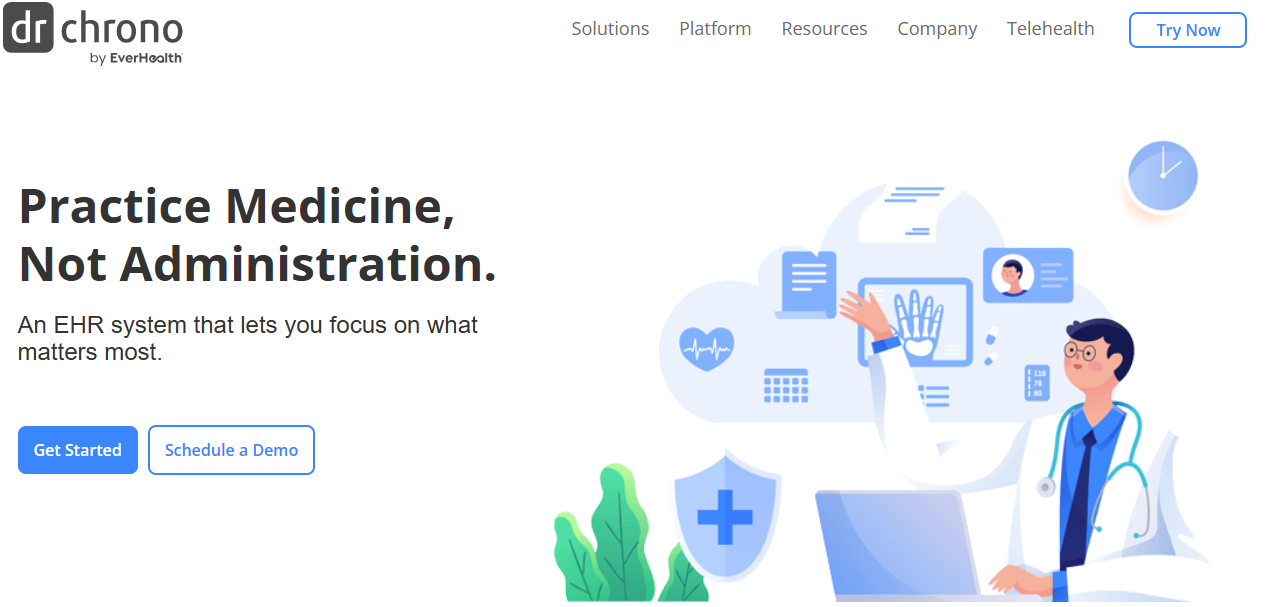

DrChrono is like a digital assistant for doctors. It’s a tool that helps them with patient management, appointments, and billing. It is a one-stop solution for medical offices. Doctors can check their schedules, write prescriptions, and even send bills with just a few clicks. Patients also prefer it because they can access their health records easily. It’s like having a virtual clinic in your pocket. DrChrono makes healthcare more efficient and convenient for both doctors and patients.
Pros
- At no additional cost, they let you transfer your old EHR information.
- Serving over 17 million patients.
- Provide a complete, comprehensive suite of services and solutions.
- Built-in, smooth telemedicine application.
- DrChrono’s cost is competitive.
Cons
- Complaints exist that the system can sometimes be slow.
- If you have an issue, you must submit a work order for a solution, which isn’t always immediate.
- Reports of slowness due to maintenance updates.
4. eClinical Works
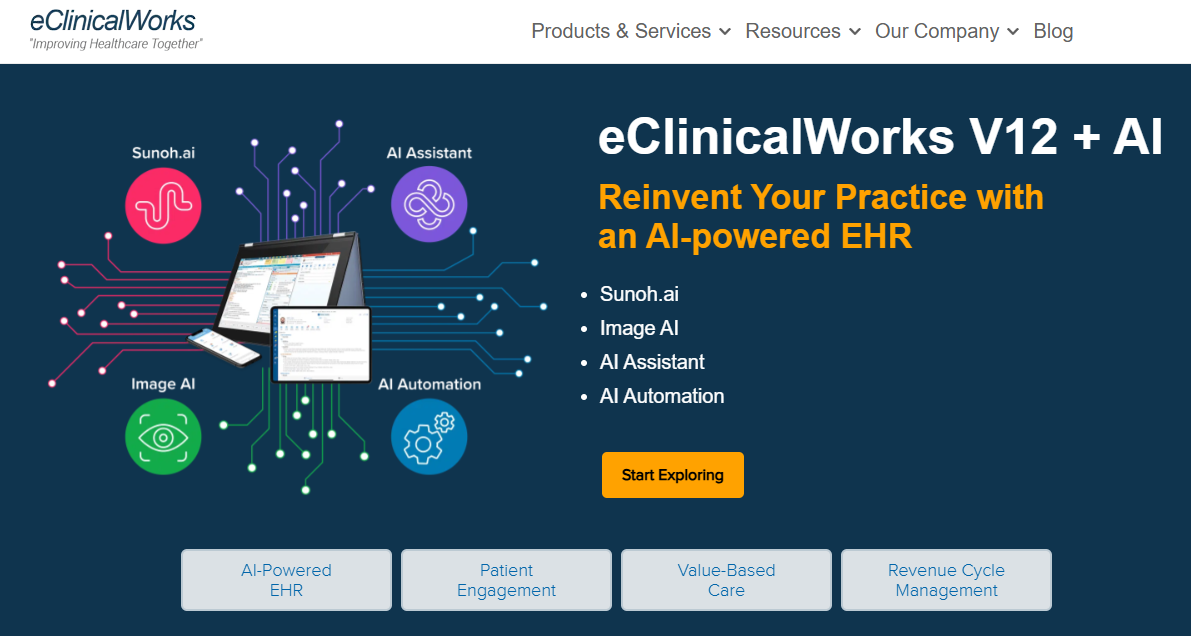

eClinicalWorks is a healthcare platform packed with innovative tools. It features a Patient Portal where patients can schedule appointments, view labs and medications, and chat with their physician. eClinicalWorks collaborates with Healow apps for iOS and Android phones. Use Healow Open Access to help patients schedule appointments according to open slots. With Check-In, they can provide information about their insurance, sign forms and consent, and review their history before the visit. healowPay simplifies bill payment logistics. Use eClinicalMessenger to remind your patients about their appointments, wellness checks, or lab results. You’ll love Eva, the platform’s AI virtual assistant! She can fetch patient histories, let you compare past and current progress notes, and book appointments in a jiff!
Pros
- Detailed electronic health records.
- Works with Healow apps.
- eClinicalMessenger for reminders.
- Eva is a capable virtual assistant.
- Revenue cycle management (RCM) to monitor earnings.
Cons
- Customer support may have long wait times.
- The interface isn’t quite user-friendly.
5. Kareo Clinical
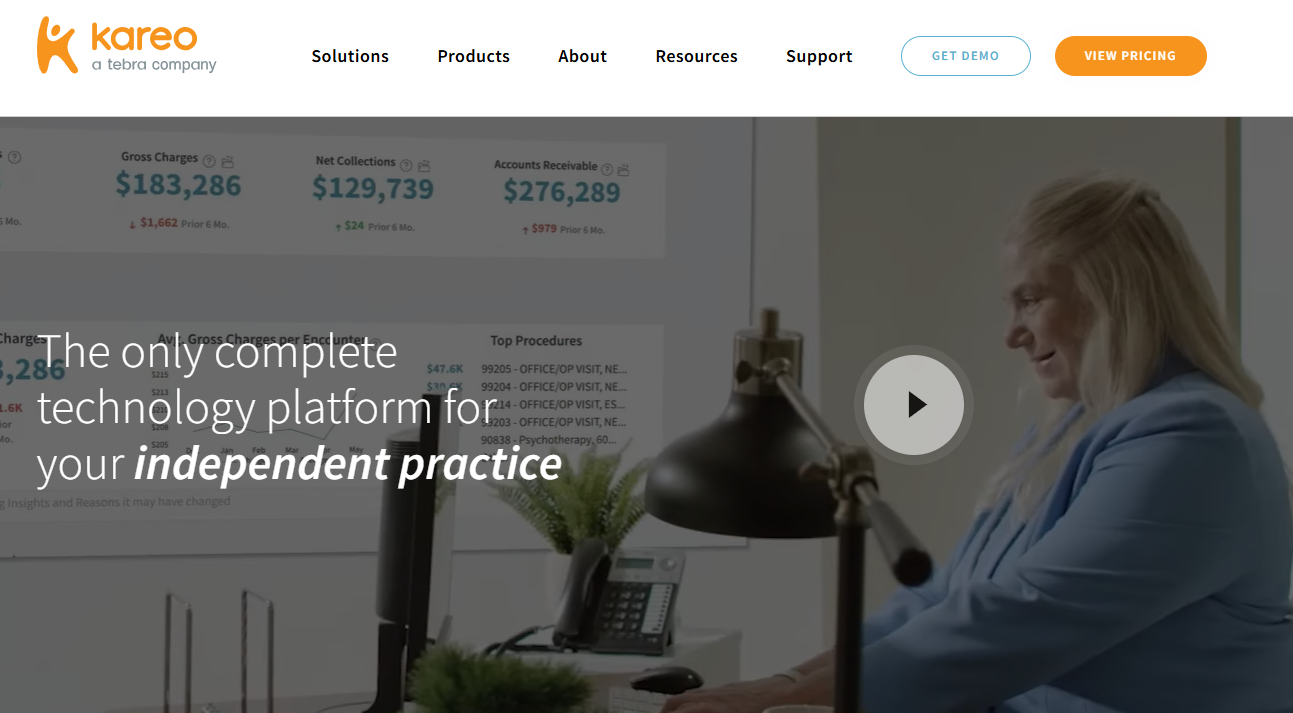

Kareo Clinical is a user-friendly EMR/PM that allows hospitals and healthcare providers to group patient information into an easy-to-read format. It will enable these functions to be carried out, including booking appointments, billing medical bills, and maintaining patient records. On the same token, besides Kareo’s clutching on to patient health records, collection of clinical data, treatment course, and billing information, there remains to be a divide among healthcare providers in effectively managing medical clinics.
Pros
- It has an intuitive design and is easy to use.
- Best suited for practices with up to ten practitioners.
- Comprehensive analytics.
- Immediate processing.
- Efficiently train staff to use the software.
Cons
- Scheduling is fee-based.
- Enrolling providers can take a lot of work.
- The system can be slow, especially when uploading documents.
- Customer support is outsourced.
6. NextGen
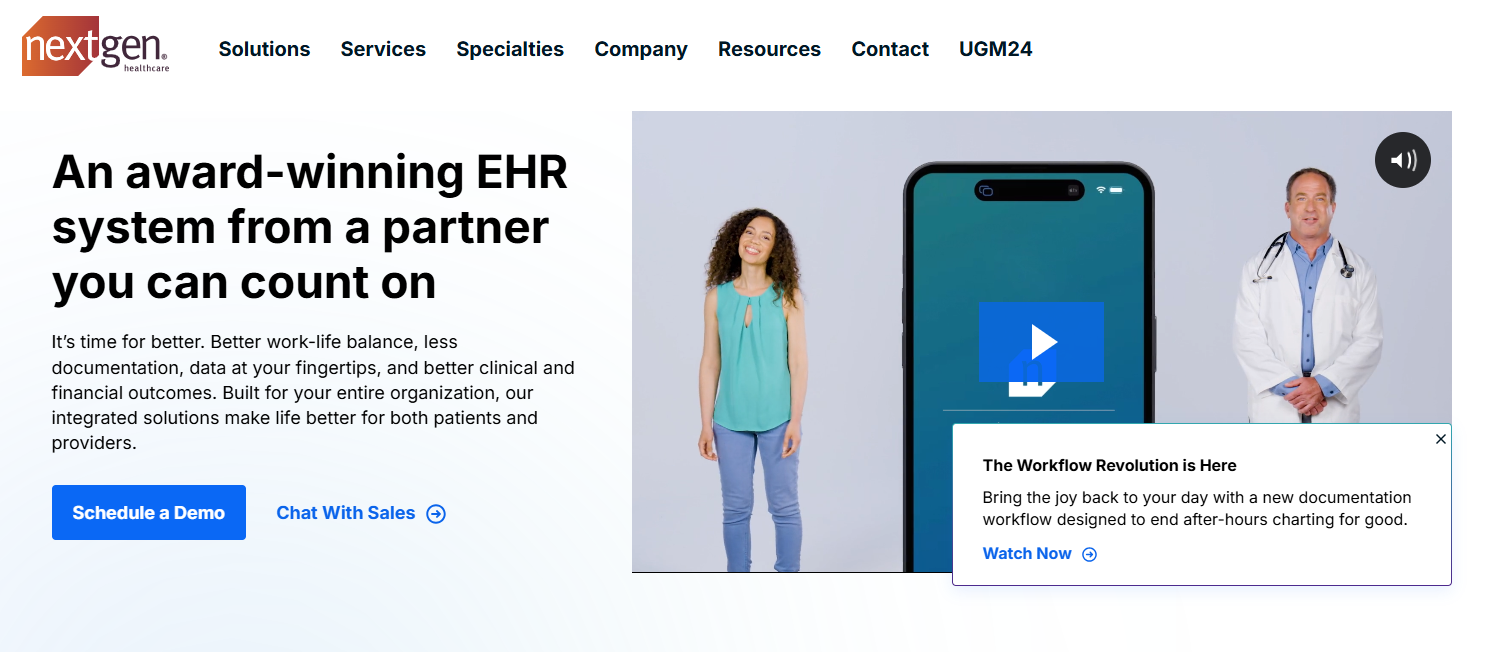

NextGen is a comprehensive solution for electronic health records, practice management, and revenue cycle management. The platform lets you create cloud-based EHRs for patients, covering their medical history, allergies, and medications used. Your staff and patients can access relevant records from any device. In terms of practice management, NextGen has customizable scheduling options. You can configure calendars to prevent overbooking and allow patients to schedule online appointments.
Your staff will appreciate NextGen’s color-coded scheduling templates, which are ideal for grouping patients. NextGen’s revenue cycle management options can support various decision-making processes. Build transparent billing mechanisms, spot denials, and enhance the velocity of collections. NextGen offers digital documentation solutions that help complete PDF forms offline. When you’re back on the internet, connect to the cloud, and your forms will be synced.
Pros
- Cloud-based EHRs.
- Customizable scheduling options with color-coded templates.
- Revenue cycle management.
- Offline form management.
Cons
- Occasional glitches.
- The user interface could be improved.
7. Allegiance MD
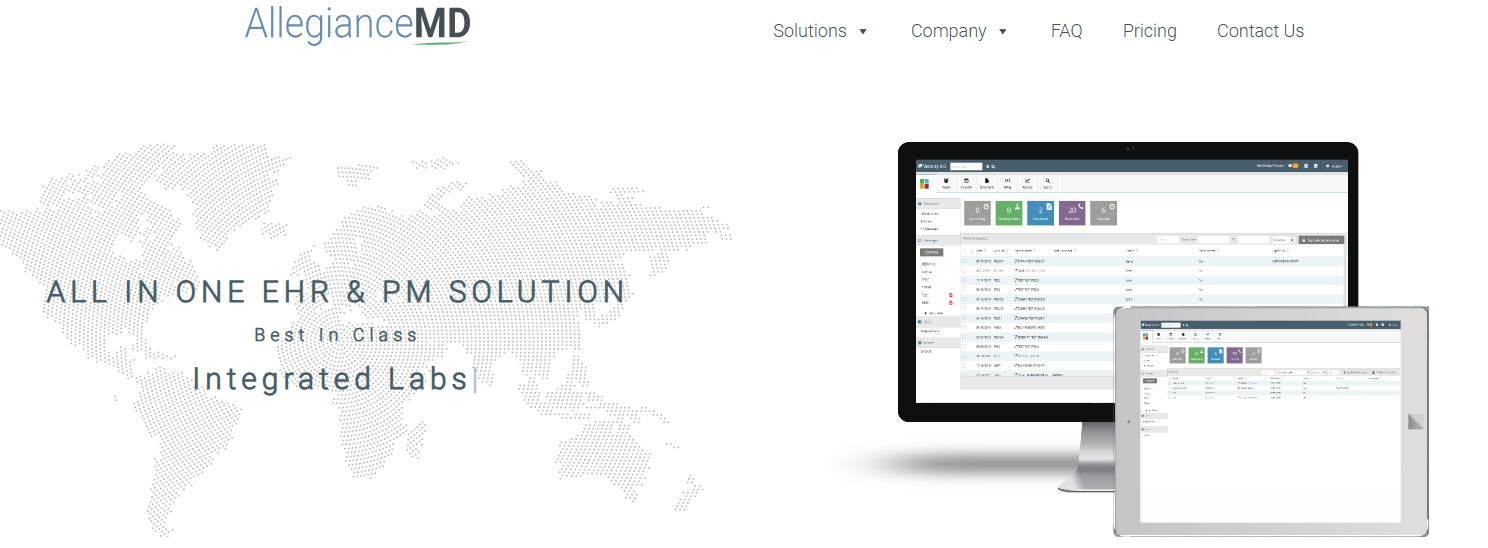

AllegianceMD is a user-friendly tool combining robust EHR options with impressive practice management features. With its ePrescriptions, you can get rid of prescription pads! The platform can check interactions between allergies, drugs, and diseases to help finalize prescriptions. It can also track patient insurance eligibility and send electronic prescriptions to pharmacies.
The Patient Portal makes your practice run smoothly. Patients can register online, fill out demographic data from the comfort of their homes, set appointments, send refill requests, and review their medical records. Set automated reminders for patient appointments and prevent bottlenecks in your schedule. The portal enables patients to make payments online and view their statement history.
Pros
- Handy electronic prescriptions.
- Centralized patient database.
- Automated reminders.
- Refill request management.
Cons
- The platform may lag occasionally.
- The design could use an upgrade.
8. Athena One
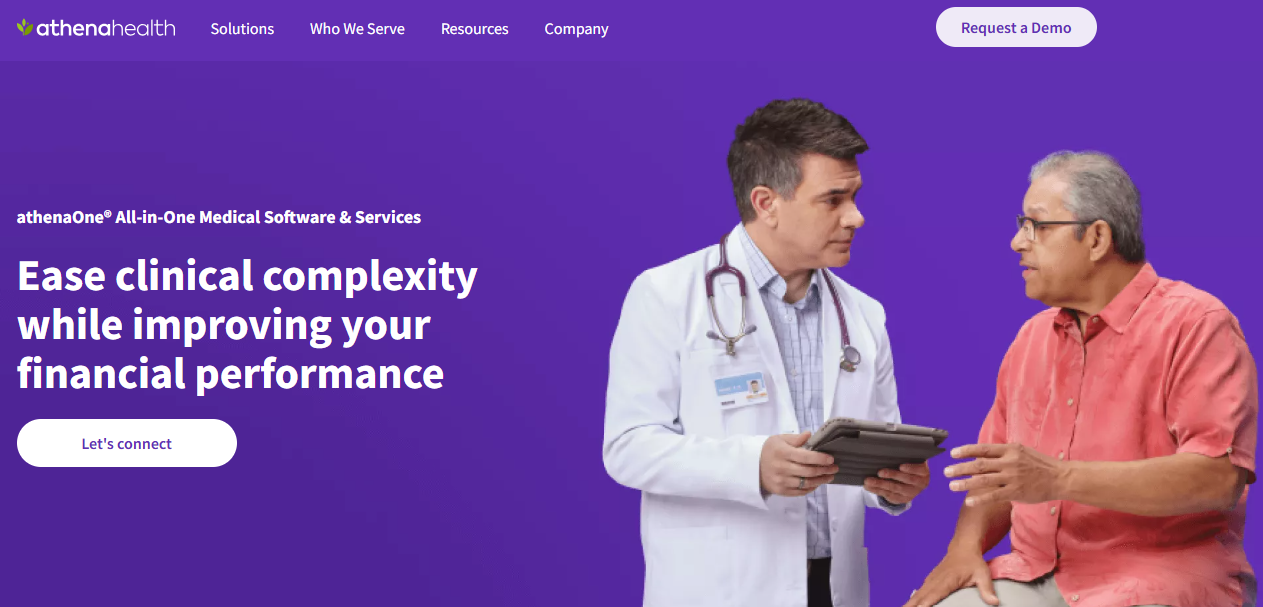

Maintain patient-focused EHRs, boost clinical efficiency, and improve client relationships with athenaOne! The platform lets you create and manage comprehensive patient records. Info about a patient’s history, allergies, problems, meds, and vaccines is always at your fingertips. Patients can also review their records, test results, and appointment dates. Use athenaTelehealth to support your patients virtually and provide them with the necessary care.
Are you tired of missed appointments? athenaOne can send automatic reminders and offer the option to cancel, allowing you to adjust your schedule. The platform supports mobile-based, in-person, and online payment options to make collections more accessible. Regarding revenue cycle management, you’ll like athenaCollector, which checks insurance technicalities and catches claim errors before submissions.
Pros
- Automatic reminders with cancellation support.
- Cloud-based medical billing.
- Built-in tool to reduce the risk of botched claims.
- AthenaTelehealth for virtual support.
Cons
- Initial setup and configuration can be challenging.
- Closing prescriptions takes work.
What Problems Does Patient Data Management System Solve?


Medical Errors: The Right Data at the Right Time
Patient data management systems help eliminate medical errors by ensuring doctors have accurate, up-to-date patient information, including medications, allergies, and past diagnoses. For example, Brigham and Women’s Hospital in Boston reduced medication errors by 55% after implementing electronic health records (EHRs), which provide clear access to patient histories and include alerts for drug allergies and interactions.
Improved Coordination of Care: Better Data for Better Care
Centralized data systems allow multiple healthcare providers to access duplicate patient records, streamlining communication and ensuring consistent care. Kaiser Permanente’s integrated EHR system enables physicians across all locations to access complete patient records. This coordination allows smooth transitions in care for patients who visit different facilities within the network.
Time-Consuming Documentation: Automate to Boost
Automated data management reduces time spent on manual documentation, allowing healthcare providers to focus more on patient care. At UCLA Health, automated EHR systems decreased time spent on documentation by about 30%, freeing up doctors to spend more time on patient care and less on administrative work.
Data Security and Privacy: Protecting Patient Information
Enhanced data management systems allow hospitals to implement more robust security protocols, protecting patient information and complying with regulations like HIPAA. The Mayo Clinic, for example, invested in robust cybersecurity measures for their patient data management, including data encryption and access controls, ensuring data privacy and compliance with legal standards.
Inconsistent Data Formats: Standardization Is Key
Standardizing data formats through management systems makes it easier to integrate information across departments, from imaging and labs to billing and patient portals. Johns Hopkins Health System adopted a system that combines data from different departments, enabling healthcare providers to view complete and standardized records, which improves decision-making and efficiency.
Predictive Analysis and Proactive Care: A Data-Driven Approach
Organized patient data enables healthcare providers to use AI and analytics for early diagnosis, risk assessment, and personalized treatment. Mount Sinai Health System uses predictive analytics on its centralized patient data to identify patients at high risk for conditions like sepsis, allowing proactive interventions that save lives and improve outcomes.
Patient Satisfaction and Engagement: Keeping Patients in the Loop
Patients can access their records and test results faster through portals and apps, enhancing transparency, trust, and engagement. Cleveland Clinic offers a patient portal where individuals can view test results, message doctors, and schedule appointments, improving patient satisfaction and allowing them to participate actively in their care.
Reduced Healthcare Costs: Improving Efficiency and Affordability
Data management prevents duplicate tests and minimizes errors, significantly cutting healthcare costs. Intermountain Healthcare in Utah reported over $100 million savings by using data management to reduce unnecessary procedures, improve efficiency, and make healthcare more affordable for patients.
Azulity: Your Go-To for Healthcare Master Data Management
Azulity focuses on healthcare master data management, bringing proven experience in implementing healthcare data solutions and credentialing across the United States. Our comprehensive platform ensures consistent patient, provider, location, and claims data synchronization across all systems and departments.
Key features include healthcare MDM, provider MDM, reference data management, credentialing, and provider enrollment. We serve healthcare technology leaders—from CIOs and CDOs to VPs of data platforms and credentialing—helping them eliminate the costly problems of fragmented data systems. Book a call to learn more about our healthcare master data management services today!
Book a Call to Learn More About Our Healthcare Master Data Management Services
Azulity focuses on healthcare master data management, bringing proven experience in implementing healthcare data solutions and credentialing across the United States. Our comprehensive platform ensures consistent patient, provider, location, and claims data synchronization across all systems and departments.
Key features include healthcare MDM, provider MDM, reference data management, credentialing, and provider enrollment. We serve healthcare technology leaders—from CIOs and CDOs to VPs of data platforms and credentialing—helping them eliminate the costly problems of fragmented data systems. Book a call to learn more about our healthcare master data management services today!
